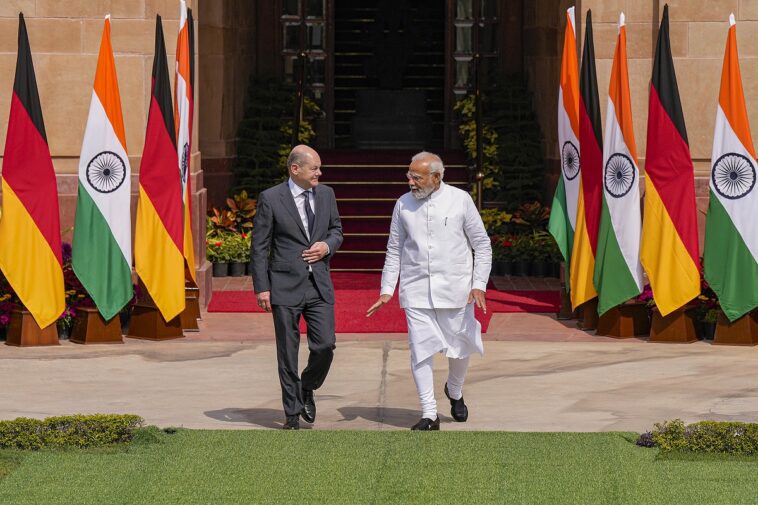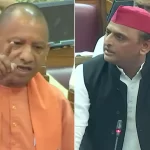Prime Minister Narendra Modi said on Saturday, following talks with visiting German Chancellor Olaf Scholz, that India has insisted on resolving the Ukraine crisis through dialogue and diplomacy and is prepared to contribute to any peace process.
The Ukraine war entered its second year hours before Scholz’s arrival in New Delhi on Saturday. He referred to the conflict as a “major catastrophe” because it violated the principle of not altering borders through the use of force. Scholz stated in a joint press conference with Modi that it is crucial for nations to state their position on the war at the United Nations.
German officials have indicated that the Ukraine crisis, expanding trade and investment, and combating climate change will be at the forefront of Scholz’s two-day visit. The Russian invasion of Ukraine has cast a shadow over discussions at the G20 finance ministers’ meeting in Bengaluru, and the German finance minister Christian Lindner has stated that it will be unacceptable for his country if a proposed communique watered down the condemnation of Russia’s actions.
PM Modi remarked that the Covid-19 pandemic and the Ukraine conflict have had a negative impact on developing nations and called for collaborative efforts to address these issues. “We continue to emphasise this even during India’s G20 presidency,” he said in Hindi during the joint media interaction.
Since the beginning of the events in Ukraine, India has insisted that this dispute be resolved through dialogue and diplomacy. “India is willing to contribute to any peace process,” said Prime Minister Modi.
Scholz referred to the war as a “major catastrophe” because of the massive destruction of infrastructure and energy grids in Ukraine. He stated, “But above all, it is a disaster, a catastrophe, because we know that this war violates a fundamental principle on which we had all agreed for so long, namely, that you do not alter borders through the use of force.”
Scholz, while calling for the upholding of international law, added: “Therefore, it is essential that we repeatedly state our position on this issue at the United Nations.” Scholz also noted that India held the G20 presidency during a “difficult period” and expressed confidence that “India will fully comply with what is required in this regard.”
India has refrained from public criticism of the Russian invasion, although Prime Minister Narendra Modi told Russian President Vladimir Putin during a September meeting that “today is not a time of war.” India has also abstained on nearly all UN resolutions regarding Ukraine, including this week’s adoption by the General Assembly of a resolution urging Russia to immediately withdraw its troops from Ukraine.
Security and defence cooperation could become an important pillar of the India-Germany strategic partnership, according to PM Modi, and the two countries are actively cooperating to combat terrorism and separatism. “Both nations concur that concerted action is required to end transnational terrorism,” he said.
In addition, he demanded that multilateral institutions be reformed so that they reflect contemporary global realities. In this context, he mentioned India and Germany’s efforts within the G4 to reform the UN Security Council.
Prime Minister Modi urged India’s largest trading partner in Europe, Germany, to take advantage of the “Make in India” and “Self-Reliant India” initiatives. According to him, the migration and mobility partnership agreement signed by the two parties in December will further strengthen their relationship.
Scholz also cited the migration pact as an example of what can be accomplished on a global scale, stating, “Many skilled workers and qualified personnel from India have taken advantage of the opportunity.” He stated that the agreement will assist Germany in addressing challenges in key areas such as research and development, information technology, and software by employing qualified Indian workers.
He noted that 1,800 German companies with operations in India have created tens of thousands of jobs and stated that he expects this number to skyrocket. Germany is also interested in strengthening trade ties between the European Union (EU) and India and desires that negotiations on free trade and investment protection agreements be concluded expeditiously. “I will personally see to it that this does not drag on,” he declared.
Also read this:FATF suspends Russia’s membership over Ukraine war
Scholz stated that combating climate change – “the central issue for the future of humanity” – also came up in his discussions with Modi regarding the need for the two countries to expand cooperation under their green and sustainable development partnership in areas such as solar, power, biomass, and green hydrogen.




